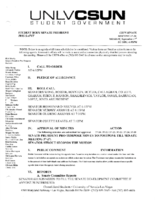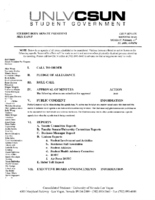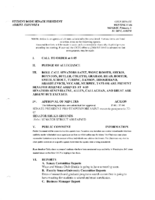Search the Special Collections and Archives Portal
Search Results
UNLV Libraries Collection of Binion’s Horseshoe Hotel and Casino Promotional and Press Materials
Identifier
Abstract
The UNLV Libraries Collection of Binion’s Horseshoe Hotel and Casino Promotional and Press Materials includes clippings, press kits, press releases, and promotional materials dating from 1963 to 2004 for Binion’s Horseshoe Hotel and Casino in Las Vegas, Nevada.
Archival Collection
UNLV Libraries Collection of Peppermill Casinos Incorporated Promotional and Press Materials
Identifier
Abstract
UNLV Libraries Collection of Peppermill Casinos Incorporated Promotional and Press Materials includes clippings and promotional materials for Peppermill Casinos Incorporated properties in Reno, Nevada, Las Vegas, Nevada, and Mesquite, Nevada, dating from 1984 to 2007.
Archival Collection
Alan Copeland Music Scores
Identifier
Abstract
The Alan Copeland Music Scores are original handwritten music scores arranged by American composer Alan Copeland from approximately 1936 to 2004. Copeland worked with various musicians and groups, such as Les Brown, the Modernaires, and Sarah Vaughn.
Archival Collection
Phillip L. Cook oral history interview
Identifier
Abstract
Oral history interview with Phillip L. Cook conducted by Richard Strahan on March 3, 1977 for the Ralph Roske Oral History Project on Early Las Vegas. Cook first talks about his parents' move to Nevada and discusses how the school system has changed over time. He then describes the first businesses that opened up in the Downtown and Strip areas of Las Vegas, Nevada before discussing prostitution, Block 16, and recreational activities available to youth. Cook also talks about the first television sets and telephone systems made available, and he moves on to talk about the prices of things such as movies and haircuts when he was younger. The interview then moves to discussions on the Old Ranch, racial discrimination, school integration, the crime rate, and the school system in Las Vegas.
Archival Collection

Lily Teo oral history interview: transcript
Date
Archival Collection
Description
Oral history interview with Lily Teo conducted by Stefani Evans on February 7, 2022 for Reflections: The Las Vegas Asian American and Pacific Islander Oral History Project. Lily Teo discusses her upbringing in Singapore, her education, her religious beliefs, and converting from Buddhism to Catholicism. She talks about her husband, her early married years, and what life was like as a young mother of three children. Teo shares how she started a catering business to feed construction workers and was responsible for shopping for ingredients, preparing all meals and tea, and cooking the food on site in her temporary kitchen. She talks about her children, the faiths they practice and languages they speak including English, Malay, and Mandarin, and the customs and traditions they practice, such as celebrating Lunar New Year and other holidays. Lily's daughter, Stella, sits in on the interview and expands on her mother's recollections.
Text

Arturo Ochoa interview, April 9, 2019: transcript
Date
Archival Collection
Description
On the corner of Eastern and Stewart, inside the East Las Vegas Community Center, lies an oasis of creativity and art. The halls ring with the sound of harmonious music coming from the meeting rooms, where children move violin bows up and down in a synchronized motion. They stare with concentration at the music sheets in front of them. They gracefully play together and fill the empty halls with classical music. For most of them, they are the first in their family to learn how to play an instrument. Like many in their neighborhood, they are also first-generation Americans. The students are rehearsing for their recital with the Las Vegas Philharmonic at the Smith Center in a few weeks. In the back of the room there is a man gleaming with pride and joy. The Foundation to Assist Young Musicians (FAYM) provides the rehearsal space, violins, and music lessons at the community center and allows these children to flourish despite their economic, social, or racial background through, “Building
Text

Meeting minutes for Consolidated Student Senate University of Nevada, Las Vegas, April 13, 1989
Date
Archival Collection
Description
Text

Meeting minutes for Consolidated Student Senate, University of Nevada, Las Vegas, September 17, 2007
Date
Archival Collection
Description
Text

Meeting minutes for Consolidated Student Senate, University of Nevada, Las Vegas, February 11, 2008
Date
Archival Collection
Description
Text

Meeting minutes for Consolidated Student Senate, University of Nevada, Las Vegas, February 05, 2007
Date
Archival Collection
Description
Text
